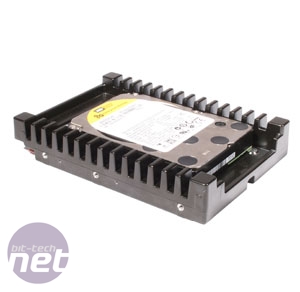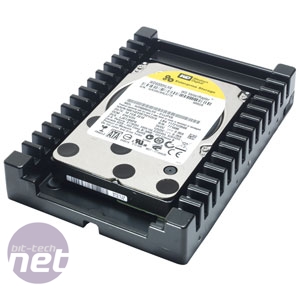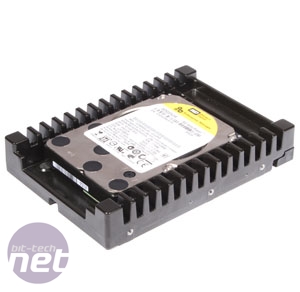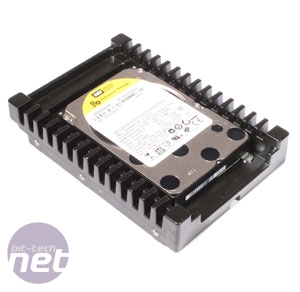
Performance Analysis
There’s absolutely no doubt that the VelociRaptor is the fastest hard disk we’ve ever tested, resoundingly besting even the large-capacity drives on the market. While the sequential speeds in AS SSD of 151MB/sec read and 149MB/sec write, and in ATTO of 160MB/sec read and 154MB/sec write, weren’t a great deal quicker than the 1TB Samsung SpinPoint F3, it’s the access times that are crucial here.In AS SSD’s access time tests the VelociRaptor responded in, on average, just 7.2ms to random read requests and in just 1.7ms to random write requests. This is close to 40 per cent faster than the next best drive, the Western Digital 2TB Caviar Black, when it comes to access times.
These much quicker access times, a consequence of the faster spindle speed and smaller 2.5in form factor, allowed the VelociRaptor to deliver excellent random performance for a hard disk. In our Iometer test, the random read speed of 1.24MB/sec is 32 per cent faster than the 2TB Caviar Black. Random write speeds were even better, hitting 2.21MB/sec, some 61 per cent faster than the 2TB Caviar Black.
It was in real world circumstances such as loading STALKER: Call of Pripyat that these improved access times become the most obvious though. The VelociRaptor 600GB out-performed every other hard disk drive by three seconds when connected via a SATA 3Gbps port. When booting Windows 7 64-bit, the VelociRaptor was again conclusively faster than the hard disk competition, reaching the desktop in only 48 seconds, nine seconds faster than the Western Digital 2TB Caviar Black.
Despite the SATA 6Gbps port and compatibility making little difference when it come to theoretical performance, in real world uses, we found the VelociRaptor slowed down. Loading STALKER: Call of Pripyat took an extra three seconds and booting Windows an extra 17 seconds. The latter result was skewed by the extra time taken by the storage card to initialise. For this reason, the Crucial C300 boot test was performed via a SATA 3Gbps port for a more representative comparison.
Typically 10,000rpm hard disks have been noisy affairs, and while the VelociRaptor can sound like a tin full of angry bees under heavy load, for the most part the disk was well behaved and quiet. This was especially true during sequential reads or writes. You will hear the disk clacking away when booting your PC however, where the random workload is heavy.
Conclusion
You’ll notice during our performance analysis that we’ve specifically not compared the VelociRaptor to an SSD, and this is because, while they're both forms of high-performance storage, we don’t feel the two can be fairly compared. It’d be like comparing an HGV with a sports car – they both do technically the same thing, but are better suited to different tasks.While the VelociRaptor 600GB is a very fast hard disk, and grants obvious performance benefits over hard disk drives, it just can’t expect to match the near-instant responsiveness and feeling of using an SSD as a boot disk, and our testing backs this up. We haven't included The Crucial C300 256GB in the access time or random read write latency tests simply because it would horribly skew the graph.
However, the VelociRaptor 600GB does deliver a 10-15 per cent improvement in real world circumstances in comparison to the best hard disk drives, meaning that it has a use as a fast bulk-storage drive. We’ve talked before about the size limits of SSDs holding them back, but the VelociRaptor 600GB combines both a palpable speed improvement over typical hard disks and more than enough space for the biggest Steam install or a holiday’s worth of RAW files to batch-process.
For that 10-15 per cent performance improvement you pay a hefty price though. At £209.99 the VelociRaptor works out at £0.37/formatted GB, whereas the Western Digital 2TB Caviar Black weighs in at just £130.65, or £0.07/formatted GB. This means that the VelociRaptor can only be seen as a luxury product. Despite unmatched performance versus other hard disks, and much better value per GB than an SSD, the VelociRaptor 600GB isn’t so much faster than a cheaper high-capacity hard disk that it’s worth buying. For high-performance storage, an SSD is still the best option.
- Performance
- x
- x
- x
- x
- x
- x
- x
- x
- x
- -
- 9/10
- Value
- x
- x
- x
- x
- x
- -
- -
- -
- -
- -
- 5/10
- Overall
- x
- x
- x
- x
- x
- x
- -
- -
- -
- -
- 6/10

MSI MPG Velox 100R Chassis Review
October 14 2021 | 15:04












Want to comment? Please log in.